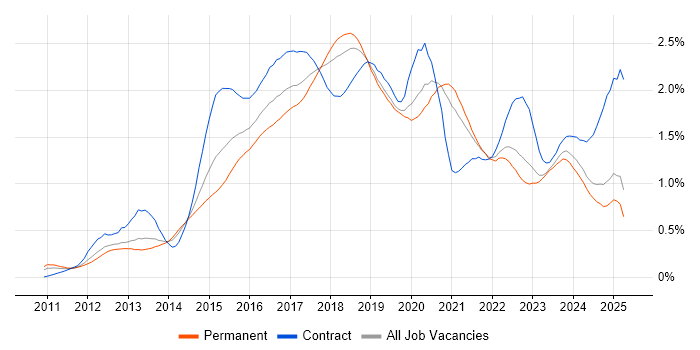MongoDB
England > North of England
The table below provides summary statistics for permanent job vacancies advertised in the North of England requiring MongoDB skills. It includes a benchmarking guide to the annual salaries offered in vacancies that cited MongoDB over the 6 months leading up to 1 May 2025, comparing them to the same period in the previous two years.
| 6 months to 1 May 2025 |
Same period 2024 | Same period 2023 | |
|---|---|---|---|
| Rank | 218 | 181 | 292 |
| Rank change year-on-year | -37 | +111 | -61 |
| Permanent jobs citing MongoDB | 90 | 235 | 147 |
| As % of all permanent jobs advertised in the North of England | 0.82% | 1.36% | 0.84% |
| As % of the Database & Business Intelligence category | 8.01% | 7.55% | 4.06% |
| Number of salaries quoted | 61 | 129 | 110 |
| 10th Percentile | £47,500 | £41,250 | £37,250 |
| 25th Percentile | £50,000 | £42,500 | £46,063 |
| Median annual salary (50th Percentile) | £67,037 | £57,500 | £60,000 |
| Median % change year-on-year | +16.59% | -4.17% | +7.75% |
| 75th Percentile | £73,886 | £71,991 | £72,500 |
| 90th Percentile | £77,500 | £81,750 | £83,750 |
| England median annual salary | £70,000 | £60,000 | £67,500 |
| % change year-on-year | +16.67% | -11.11% | -3.57% |
All Database and Business Intelligence Skills
North of England
MongoDB falls under the Databases and Business Intelligence category. For comparison with the information above, the following table provides summary statistics for all permanent job vacancies requiring database or business intelligence skills in the North of England.
| Permanent vacancies with a requirement for database or business intelligence skills | 1,123 | 3,113 | 3,623 |
| As % of all permanent jobs advertised in the North of England | 10.25% | 18.02% | 20.81% |
| Number of salaries quoted | 837 | 2,332 | 1,838 |
| 10th Percentile | £31,250 | £31,579 | £35,000 |
| 25th Percentile | £41,000 | £40,000 | £41,243 |
| Median annual salary (50th Percentile) | £55,000 | £50,000 | £55,000 |
| Median % change year-on-year | +10.00% | -9.09% | +10.00% |
| 75th Percentile | £71,250 | £65,603 | £70,000 |
| 90th Percentile | £82,751 | £82,500 | £81,250 |
| England median annual salary | £62,779 | £57,500 | £65,000 |
| % change year-on-year | +9.18% | -11.54% | +8.33% |
MongoDB
Job Vacancy Trend in the North of England
Job postings citing MongoDB as a proportion of all IT jobs advertised in the North of England.

MongoDB
Salary Trend in the North of England
3-month moving average salary quoted in jobs citing MongoDB in the North of England.
MongoDB
Salary Histogram in the North of England
Salary distribution for jobs citing MongoDB in the North of England over the 6 months to 1 May 2025.
MongoDB
Job Locations in the North of England
The table below looks at the demand and provides a guide to the median salaries quoted in IT jobs citing MongoDB within the North of England region over the 6 months to 1 May 2025. The 'Rank Change' column provides an indication of the change in demand within each location based on the same 6 month period last year.
| Location | Rank Change on Same Period Last Year |
Matching Permanent IT Job Ads |
Median Salary Past 6 Months |
Median Salary % Change on Same Period Last Year |
Live Jobs |
|---|---|---|---|---|---|
| North West | -55 | 64 | £67,037 | +2.40% | 74 |
| Yorkshire | +41 | 18 | £62,500 | +31.58% | 37 |
| North East | +33 | 8 | £55,000 | +15.79% | 15 |
| MongoDB England |
|||||
MongoDB
Co-occurring Skills and Capabilities in the North of England by Category
The follow tables expand on the table above by listing co-occurrences grouped by category. The same employment type, locality and period is covered with up to 20 co-occurrences shown in each of the following categories:
|
|
||||||||||||||||||||||||||||||||||||||||||||||||||||||||||||||||||||||||||||||||||||||||||||||||||||||||||||||||||||||||||||||
|
|
||||||||||||||||||||||||||||||||||||||||||||||||||||||||||||||||||||||||||||||||||||||||||||||||||||||||||||||||||||||||||||||
|
|
||||||||||||||||||||||||||||||||||||||||||||||||||||||||||||||||||||||||||||||||||||||||||||||||||||||||||||||||||||||||||||||
|
|
||||||||||||||||||||||||||||||||||||||||||||||||||||||||||||||||||||||||||||||||||||||||||||||||||||||||||||||||||||||||||||||
|
|
||||||||||||||||||||||||||||||||||||||||||||||||||||||||||||||||||||||||||||||||||||||||||||||||||||||||||||||||||||||||||||||
|
|
||||||||||||||||||||||||||||||||||||||||||||||||||||||||||||||||||||||||||||||||||||||||||||||||||||||||||||||||||||||||||||||
|
|
||||||||||||||||||||||||||||||||||||||||||||||||||||||||||||||||||||||||||||||||||||||||||||||||||||||||||||||||||||||||||||||
|
|
||||||||||||||||||||||||||||||||||||||||||||||||||||||||||||||||||||||||||||||||||||||||||||||||||||||||||||||||||||||||||||||
|
|
||||||||||||||||||||||||||||||||||||||||||||||||||||||||||||||||||||||||||||||||||||||||||||||||||||||||||||||||||||||||||||||
